 |
 |
| |
|
| |
|
|
| |
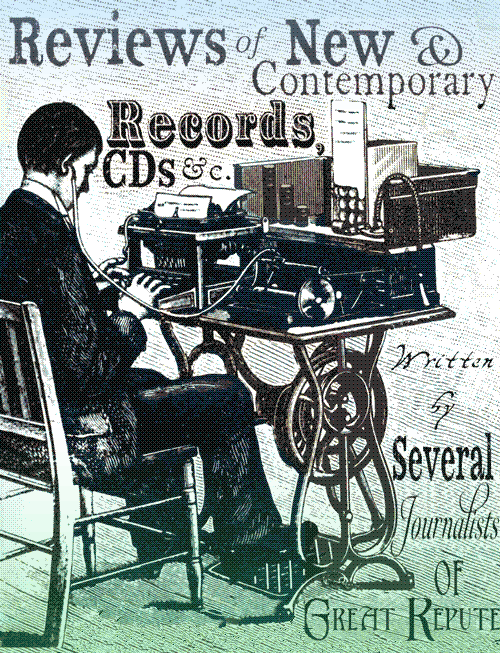 |
|
| = November 2011 = |
|
|
| Azusa Plane |
| Pearls of Amber |
| Savaging Spires |
| Sproatley Smith |
| Son of Skooshny |
| Lost Souls |
| The Story |
| Hot Knives |
| |
| |
| |
| |
| |
| |
| |
| |
| |
| |
| |
| |
| |

Home |
AZUSA PLANE - WHERE THE SANDS TURN TO GOLD
(2 CD & 1 DVD boxed set from www.rocketgirl.co.uk)
Listening at this remove, there is a darkness, a sombre brooding air that pervades the music of the Azusa Plane which I don’t recall hearing there before. I remember their music being uplifting; spiritual almost. I recall the sheer passion of the detuned guitars sounding not so much fed as pushed through amps overdriven to the max, the sounds ebbing and flowing in a beautiful yet nonsensical manner like riding dreams to paradise on the back of a tide of ennui; I remember the emotional intensity of the music meaning it was never something which was just “on”, but something which one needed to sit down and listen to, to be both simultaneously intoxicated and anaesthetised by. But yet, at the same time I remember knowing Jason DiEmilio as a beautiful person, with a wonderfully dry sense of humour. He was on reflection a reserved soul who communicated primarily through music rather than through words. When I first interviewed him for the Terrascope back in 1997 he said his plan was to release just ten 7” records and then retire altogether, and I am reminded on listening to his music again today, not for the first time, of Nick Drake. Live performances were few and far between, and I feel privileged not only to have witnessed a handful - not least at Terrastocks 1, 2 and 3 - but also to have had a hand in releasing several recordings via the Terrascope, not least the band’s debut CD ‘Tycho Magnetic Anomaly And The Full Consciousness of Hidden Harmony’ in 1997, which was the second release on Tony Dale’s Camera Obscura Records label, part-funded by ourselves and thus featuring the Terrascope’s logo, with artwork by our then in-house designer Davina Ware.
Tragically, unbelievably almost, both Tony Dale and Jason DiEmilio have now been taken from us - the latter unfortunately having ultimately suffered for his art, whereas Tony thankfully was at least spared that. Jason’s exposure to high noise levels however culminated in a tortuous combination of tinnitus and hyperacusis, rendering him unable to listen to music and eventually to take his own life in 2006. As Richard Milward notes in his exemplary, beautifully written sleeve notes to this release - honestly, it’s worth buying just to read those, let alone immerse yourself in the otherwordly sounds on the discs therein - ‘DiEmilio must stand as one of the greatest, most overlooked, tortured artists of his generation. There was something Christ-like about the Azusa Plane, the way DiEmilio’s ears and confidence suffered to bring us such mind-blowing aural pleasure...’
Luckily for us however, Jason had a good friend - a very very good friend - in Vinita Joshi, of Rocket Girl Records (Vinita was also a co-organiser of Terrastock 3). Vinita tell her own story in the opening credits to this boxed set, and I defy you not to be moved to tears when you read it. ‘Where The Sands Turn To Gold’ is very much a labour of love in every respect; but it’s also a great deal more than that: it’s a eulogy, it’s a memorial, it’s a chance for Jason’s friends to express themselves - and above all, it’s a bloody good album.
The musical high point comes arguably nine minutes into the eighth track on CD #2, ‘Cheltenham #2’, a song which was originally released as a 10” record by Ochre Records in 1998 (who were I think based in Cheltenham, Gloucestershire; hence perhaps the title). It’s pure essence of Floyd distilled into something uniquely abstract, and experiencing it is to hear some of the most mindbending experiments with a fender guitar ever committed to tape. Or maybe it’s the live outtakes from Terrastock 1 (26th April 1997) included on the DVD with this set, which are quite simply incredible. I can’t help but also love the way ‘Meander’ on CD1 has so obviously been lifted from one of the 500 copies pressed of the Azusa Plane’s debut 7” on Doorstep Vinyl in 1995 though, complete with vinyl crackles; and cuts such as the wonderful ‘She Was Into S&M And Bible Studies. Not Everyone’s Cup Of Tea, Even She Would Admit To Me. Her Cup Of Tea She Would Admit To No-One’ from a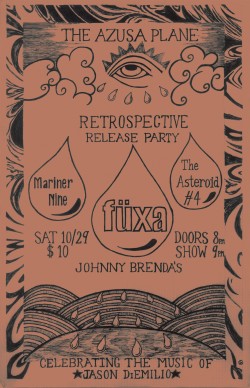 1997 split 7” with Roy Montgomery (not sure now if that was before or after the two of them met at Terrastock) have stood the test of time particularly well too. 1997 split 7” with Roy Montgomery (not sure now if that was before or after the two of them met at Terrastock) have stood the test of time particularly well too.
For me though, it’s the presentation and packaging which makes this, and in particular the 80+ page booklet, which features as well as the track-listing a full discography, a selection of photos, some tremendous typography and some absolutely amazing words. I’ve already mentioned Vinita’s own eulogy and that of the utterly brilliant Richard Milward (another of his quotes: “Your eardrums were designed to listen to the Azusa Plane” - yes!!), but also worthy of note are memories from former band-mates Jason Knight and Quentin Stolfus - tellingly, it was DiEmilio who introduced Jason Knight initially to Flying Saucer Attack; pieces from fellow musicians Brian McTear and Randall Nieman; and what appears to be a college dissertation on the impact of the Azusa Plane on avante-garde music in Philadelphia, complete with carefully annotated cross-references to various authoritative sources, by one Brian Gempp. Astonishing stuff all round, for me one of THE releases of the year and one which I am incredibly proud to have contributed to in no matter how small a way. (Phil McMullen)
R.I.P. Jason DiEmilio (1970-2006) |
| |
|

Home |
AMBER – PEARLS OF AMBER
(CD available from Merlin’s Nose Records www.merlins-nose.com )
Honestly, if they never existed you feel you’d have to invent them. In fact you wonder whether this is not an elaborate spoof. Forgotten sessions that languished in the vault for almost thirty years before their first release on Nigel Cross’s Shagrat imprint in the year 2000 - a limited edition psychedelic-folk cult outing on which one of the lead instruments was a sitar, lent by Donovan, and which had in turn been given to him by George Harrison. I mean, you could be forgiven for checking the date to see if it isn’t St Stupid’s Day again already.
Anyway sure enough this is the real thing: five original compositions (and one alternative take) courtesy of Englishmen Keith ‘Mac’ MacLeod and Julian McAllister, and featuring guest musician Ray Cooper who went on to be a minor celebrity as a hired-out bongo basher to practically everyone you care to mention over the next thirty years. Mac Macleod will of course be familiar to some (sadly, a very, very few) reading this as a veteran of Terrastock #3 in 1999.
Veterans of the mid-60s Hertfordshire folk scene that also spawned Mick Softly, by the time they recorded these sessions in London in 1970 and 1971, McAllister and MacLeod, appear steeped in eastern influences. A couple or three years too late for it to be part of the zeitgeist and already sounding a bit dated, nonetheless “Sea Shell Rock Me” (two versions) and “White Angel” stand reasonable comparison with most of what obvious influence Donovan (McLeod had toured with Mr Leech as far back as 1965) and Incredible String Band had done in their late 1960s heyday or for that matter the Pentangle posse were doing about the same time. While “Sea Shell...” is impeccably hippy-dippy, a folksy love song and arguably the highlight here, the latter is almost soulful, close your eyes and you could almost imagine Jefferson Airplane belting out something very similar.
“Swan In The Evening” again builds around a sitar and also crashing cymbals, but whether this adds to or detracts from a stirring yet plaintive number will depend very much on your point of view and listening mood. The other favourite here, though, is “Sing On The Sunlight”, a thoroughly decent, quite joyful folk ballad, stripped down to guitar and a nice blend of McAllister’s pleasing tenor and tuneful background harmonies from MacLeod. Given this level of freedom and space you begin to glimpse Amber’s real potential away from the at times cloying sitar and other eastern baggage. “Earlie In The Morning” is the final track here, although it was recorded as part of the first session in 1970, and is a real Heinz 57 of yee-hah cod-Appalachian country blues; mystical folk lyrics involving maidens pledged to the tides and the sea, competent vocal harmonies, and that bloody tabla.
Of its time, you suspect - an unspectacular but respectable enough offering and if you didn’t already bag a copy at the time of its original if belated release, probably a worthwhile addition to the collection of the more committed acid-folk fan.
For further reading on Mac Macleod, here’s a link to our archive feature from Ptolemaic Terrascope issues 28 and 29:
terrascope.co.uk/MyBackPages/MacMacleod.pdf
(Ian Fraser) |
| |
|
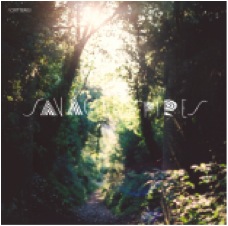
Home |
SAVAGING SPIRES – SAVAGING SPIRES
(CD/gatefold LP available from www.criticalheights.com )
What is so appealing about much of what comes to Terrascope’s notice is that it is so incongruous of time and place. Take the mysterious Savaging Spires, for instance. They are apparently from somewhere in central England but, sound wise, could just as easily hail from New England or for that matter Any Old Where.
Imagine if you will the cast of Hair, having stayed behind to litter-pick at Woodstock, still holed up in the woods on Yasgur’s farm a decade later, their haunting campfire choruses echoing away somewhere in the woods to a backdrop of plucking, tapping and whistling and you’ll be close to getting the gist of this. Opener “Bending the Rules of Time” is a case in point, a charming, almost childlike refrain superimposed with a melodic yet ghost-like mantra. Much of the rest of the album has the same barely corporeal, playful feel to it, and for the most part seems hewn from the rustic branch of some gnarled and venerated old tree.
While “Savaging Spires” more than nods at the heyday of UK acid-folk the experimental and imaginative approach the band employs means that it would be grossly unfair to write this off as a fashionable retread of past glories. Indeed the melodic structures and occasional quirky banjo (“October” for example) and a host of what sound like found instruments but most likely aren’t, places this tantalisingly some in Mid-Atlantic or should that be some lost Atlantis?. It is an album that seems to grow with momentum. Endearing as this is as a whole, from “Blackbirds” through to the closing “Seconds In Motion” in particular, Savaging Spires barely put a quirky note wrong. The slightly creepy and unsettling “Cemetery Lounge”, “Crows” with its repeat refrain exalting us to “wake up”, the ice-cream van plink and slide guitar of “Sisters” and the laid back mescaline musings of the end-piece are worth the admission price alone.
Pastorally psychedelic or bucolically barmy, it doesn’t really matter. This is at once innocent and knowing, a deceptively simple yet intelligent work that seems destined for cult status unless it can be saved from itself by lots of people going out (or staying in as the case may be nowadays) and actually buying it. Look, what are you waiting for? (Ian Fraser) |
| |
|
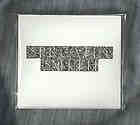
Home
|
SPROATLY SMITH - THE MINSTREL'S GRAVE
(CD from www.reverbworship.com)
All too rarely does your reviewer "go off on one" about a new band, but Sproatly Smith have been my favourite psych-folkers for some time now, and so I was delighted to receive from Master Smith a review copy of the band's new, third offering "The Minstrel's Grave." And this has to be the best album yet!
Opening with 'My Mother Said,' we are at once seduced into the Sproatly audio world of strangeness, as rustling, clinking sounds tickle the ears from left speaker and right; then it's a hint of children chattering, followed by the heavenly voice of the band's female vocalist, who is more in evidence on this album than on its predecessor. Subtle thumb piano and guitar underpins the track. 'The Mermaid Of Marden' is a ghostly cut that reminded me a little of mid-period Mercury Rev, again featuring beautiful vocals and a lovely tune; this track epitomises how well the band merge melody and original arrangements. A shop door opening leads us into 'Song For Annie Needham,' which is one of those delicate, pastoral pieces that the band do so well. 'Blackthorn Winter' opens with arpeggiated guitar before another haunting vocal melody hoves into view, ably supported by flute and violin parts; the track then heads off into a psychedelic percussion and bass section, with sitars and more all going bonkers. Just lovely, and this track has to be one of the album highlights. 'Silver Threads Among The Gold' is a brief sound-painting composed of fire and jazz, then it's time for the nine minute psychedelic folk ramble that is 'The Fabled Hare/Isobel Goudie,' a pair of tracks merged into one, where the pairing of female vocals with male works really well, as does the violin accompaniment; a bit of a Gorkys Zygotic Mynci vibe here. 'O Willow Waly' is another tuneful song beautifully sung, this time to the ticking accompaniment of a clock, while 'The Blue Flame' bears a slight resemblance to 'Scarborough Fair.' The final quartet of songs all have death as their theme, opening with 'O Death,' which features a gorgeous vocal performance set against a subtle and effective backing; another album highlight. 'Death (From S.F. Sorrow)' matches psychedelically distorted guitars with vocals and temple bells and percussion, while 'Elysium' is most unusual for a Sproatly track in that, after a marvellous synth intro, it rocks! Yes indeed, wailing guitar and drums crashing away... a bit of a change from the pastoralism, but it just about works. The album closes with the title track, which returns the listener to tinkling chimes, arpeggiated guitar and heavenly vocals.
I think I've used up all my superlatives in the above paragraphs, so I'll end by saying this is an album to cherish, enjoy, and play over and over again. I really like this band. Their sound world of bucolic, psychedelic folk, referencing late 'sixties Floyd, Circulus and Gorkys is a joy to listen to. Original, engaging, marvellous. (Steve Palmer) |
| |
|
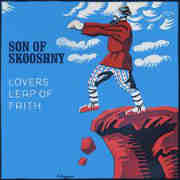
Home |
SON OF SKOOSHNY - LOVERS LEAP OF FAITH
(CD from www.skooshny.com)
The name Skooshny immediately transports me back to the earliest days of the Ptolemaic Terrascope, when ourselves and Bucketfull of Brains mag were seemingly lone voices howling into a wind of indifference regarding the magic of this band. Unaware customers would drift in to Plastic Passion Records off the Portobello Road in London, where Bill Forsyth (latterly of Minus Zero, when the joint owners split the joint lengthways) would prevail upon them to “read this, and now listen to THIS”. Many’s the time a bemused punter would find themselves going home with a Skooshny single or CD tucked into their tote bag, fast learning to discover the delights of this unassuming little band who specialised in quirky, intelligent power pop with razor-sharp lyrics, complex song structures and big fat rounded guitars. With luck if it happened to be 1994 it would be a copy of the POT-17 EP which featured Skooshny’s ‘Appetite for Mystery’, one of my favourite songs on one of my favourites of all the EPs we ever released.
It was a mystery why Skooshny f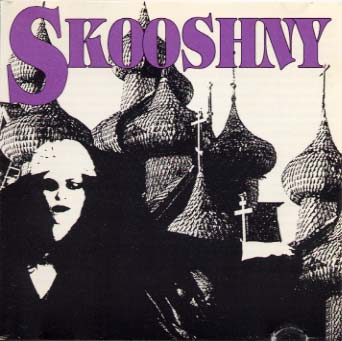 aded where bands like the Posies succeeded - not that I have or had anything against the Posies. I guess what it came down to was simply that Skooshny just weren’t glamorous enough. Maybe they needed a change of name (“Skooshny” is famously Russian for “Boring”, something no reviewer ever failed to point out). Maybe they needed a tragic, glamorous figure like the late, great Nikki Sudden fronting them instead of the charming, self-effacing Mark Breyer. Maybe it was simply a case of wrong time, wrong place. aded where bands like the Posies succeeded - not that I have or had anything against the Posies. I guess what it came down to was simply that Skooshny just weren’t glamorous enough. Maybe they needed a change of name (“Skooshny” is famously Russian for “Boring”, something no reviewer ever failed to point out). Maybe they needed a tragic, glamorous figure like the late, great Nikki Sudden fronting them instead of the charming, self-effacing Mark Breyer. Maybe it was simply a case of wrong time, wrong place.
Either way, they soon went their separate ways, leaving behind a legacy of fine music and wonderful memories. Fast forward to 2010 (or wind the clock back if you prefer: I confess I’m late in catching up with this) and Breyer has teamed up with several long-time collaborators to bring us ‘Son of Skooshny’. Missing are the other two thirds of the original Skooshny, David Winogrond and Bruce Wagner, who as far as I know still count themselves amongst Davie Allan’s quiver of Arrows these days; but long-time collaborators Jeff Peters, Steve Refling and Arthur Schlenger all more than punch their own weight.
Several songs will be familiar to a handful of you: the fans who have heard Skooshny before, or those who Bill Forsyth just happened to ambush. All of them have appeared on previous Skooshny CDs, although each was in effect a solo recording by Breyer at the time, with the exception of the fabulous ‘Kate’s Green Phone’ - my favourite, as it happens - which features the legend that is Andy Colquhoun, formerly of the Pink Fairies and Deviants, and never to be forgotten by anyone who attended the first Terrastock festival, on all instruments. ‘Science Changes Everyone’ is another old favourite that stands out.
Of the newer material, ‘Another Time’ charges along like a buffalo on bennies, ‘Good Morning, Gail Warning’ mines similar territory to the Green Pajamas of late while ‘Bare Bones’ simply begs to be heard as a set-closing instrumental work out.
If memorably hook-filled songs are your bag, then you need to get your fill of this! (Phil McMullen) |
| |
|
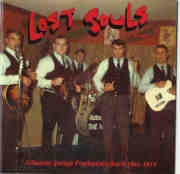
Home |
VARIOUS - LOST SOULS VOLUME 3
(CD from www.psychofthesouth.com)
It amazes me that so much music still remains to be unearthed in the period when pop music got attitude, fuzz guitars and snarl became the norm, yet the music retained a melodic innocence. I am, of course referring to '63-71, the years that this overview of obscure Arkansas music covers, although I guess the innocence had gone by end of that period. The fact that this is volume 3 and it still manages to find some real gems just proves what a fertile period it was, not just in Arkansas, but all over the globe.
Recorded in 1968, the disc starts in fine style with “I Can See Your Ways”, a definite Pebbles contender, with suitably snotty vocals and guitar provided by Richard Vanover and Bob Ralph. After the more mainstream, but enjoyable Les Soules, we get into beat mode for Robin and the Hoods, a catchy little number that moves along at a cracking pace. Much more gnarly, The Villigers get all moody on “Empty Heart”, whilst two lo-fi covers of “Susie Q and “Gloria” by The Culls and Jamie Holmes respectively, let us know where we are in time, the latter being a garage standard that has a fine groove to it, including some wonderful spelling mistakes and a sense of the absurd. More covers induced fun can be found as The Red Light Funnies turn “My Little Red Book into a basic garage stomp.
With 29 tracks, it is inevitable that quality will vary on this comp, although one man's horror is another man's favourite track, and as they are all short and generally sweet, nothing lasts too long, with another cracker just around the corner.
A case in point is the rockabilly garage of Jimmy Ford, whose “Mr Flying Saucer Man” is a gem, great guitar and some fine vocals, just perfect. Elsewhere, the brewing of “White Lightning” provides some rock and roll inspiration for Harold Morgan, whilst a solid bass-line runs through “I Wouldn't be Seen alive with Her” a atmospheric rockabilly tune from Jimmy Payne and the Jokers.
Having a British (The Hollies?) influence, “I'll Fly High” is a great beat tune with added saxophone courtesy of The Sabers, after which The Music Shoppe, return us to the moody garage with “Are You Really My Girl”, the track containing some excellent organ work that lifts the song from the mundane, sounding not unlike Creedence Clearwater Revival.
With a definite soul influence Newcastle Blues press all the right buttons on their horn-infested “Cotton's Mama”, getting the groove going right from the start, before The Tuesday Blues turn everything for a powerful rendition of “Till the End of the Day”, the tune bristling with energy and attitude.
Wringing every drop of emotion out of the tune, Lemon Meat, drink heavily in a darkened room, or so it would seem from their rendition of “Signed DC”, a lonesome Harmonica merely adding to the torment.
To maintain the strangeness, the last three songs are, in order, based on a sighting of bigfoot, a war protest with religious overtones and a weird organ led version of “Hey Joe”, possibly the epitome of sixties cover songs and a fitting way to end a most entertaining compilation, turn it up, grab yourself a beer and smile. (Simon Lewis) |
| |
|
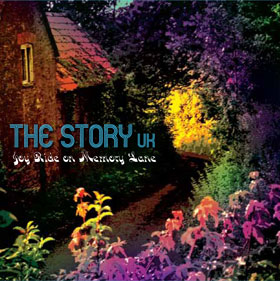
Home |
THE STORY UK – JOY RIDE ON MEMORY LANE
(CD on Rainbow Quartz)
Ex-Forest-er, Martin Welham and his son, Tom return with their third full-length collection of headswirling pastoral folk with acid tinges around the edges. [Following a couple of releases on the predominantly reissue-centric Sunbeam, the Welhams have signed with the American psych label, Rainbow Quartz, purveyors of jangly, guitar-based pop psych. The geographic appendage has been added to distinguish the project from a similarly-named U.S. folk band.] The album opens with the dreamy psych of ‘Her Name Is Love’ and by the time the poppy ‘Standing In The Rain’ seeps into the grey matter it’s perfectly clear that the Welhams have chosen the perfect imprint to release their feathery confections, as fans of labelmates The Grip Weeds, The High Dials, and Deleted Waveform Gatherings (Øyvind Holm of Terrascope faves, The Dipsomaniacs’ new project) will feel right at home.
The recordings retain that wonderful ’60s Brit psych vibe that graced Martin’s Forest recordings, with flourishes of backwards guitars, double-tracked bass, duelling guitar leads, and the odd piano tossed in to compliment their gorgeous harmonies. The songs also have more of a “rock” feel than previous recordings and, as such, may be more accessible than the ethereal, stream-of-consciousness tunes that dominated earlier releases. In this regard, the folk rock elements of Rubber Soul may be a comfortable signpost to the treasures that lie within. 'Sixty-Eight’ (an old tune Tom first heard as a wee lad on a reel-to-reel tape player) pulls out all the stops and kicks up some serious fairy dust, while ‘Andromeda’ could have sat comfortably on Kaleidoscope’s Tangerine Dream debut. [That’s “Kaleidoscope UK”, obviously - disgruntled Ed.] I also liked the strolling minstrel quality of the effervescent ‘Real World’ and ‘Magical Lantern’ wraps everything up in a warm, cozy blanket of dreamy harmonies, toadstool-inspired images, and a gnarly guitar solo.
The Welhams’ website offers a track-by-track annotation which explains how each song developed. It’s not essential to the enjoyment of the album, but gives an inside peek into their creative process. This is one of the year’s finest surprises – an album that can be appreciated by fans of folk, pop, and psych alike. (Jeff Penczak) |
| |
|
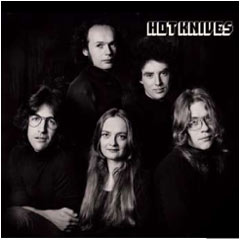
Home |
HOT KNIVES - HOT KNIVES
(CD, Grown Up Wrong Records, Australia
www.fusegroupaustralia.com)
Back in the hot summer of 76 when the Flamin’ Groovies were basking in the glory of their recently released Shake Some Action album, an off the cuff remark by their head honcho, Cyril Jordan about a new San Francisco band, Hot Knives featuring former FGs, Tim Lynch and Danny Mihm, sent me scurrying along to Larry Debay’s Bizarre emporium in Paddington to track down a copy of their debut single ‘ Lovin’ You’ b/w ‘Around the World’.
I got home and plonked the 7” slab of wax on my turntable and instead of the heavy sound I anticipated, I was instantly transported back to a more innocent time. ‘Lovin’ You’ exuded the sweet folk rock redolent of the early Byrds or indeed the British Invasion groups that had inspired them, this was more like the Searchers than ‘Teenage Head’ – and in the stolid musical climate of that time, this was captivating, a breath of fresh air. As was its flip, ‘the chooglin’ ‘Around this World’ with its echoes of early Creedence, Blackburn & Snow, the Peanut Butter Conspiracy and of course the early Signe Toly Anderson Airplane. The soulful lead vocals of Debbie and Mike Houpt really set the group apart.
I was intrigued and looked forward to more from Hot Knives – so named after the practice the group enjoyed of getting high before gigs. The band would take a knife, heat it up, place a little piece of hash on it and put another hot knife on top of that. They’d then put a funnel on top of all of it and it would explode – a very effective way of getting loaded!
I could hardly believe it when their follow-up single arrived complete with 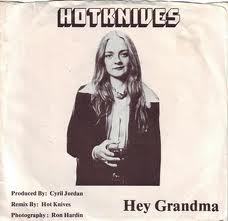 a Moby Grape cover version. It augured well for things to come but though they gigged regularly they didn’t have much of a following beyond the Bay Area, and as rock and roll underwent its seismic shift in the late 70s, Hot Knives got somehow lost in the scramble. It’s only now that their story has finally emerged through this posthumous release of an album recorded at the peak of their powers in 1976. a Moby Grape cover version. It augured well for things to come but though they gigged regularly they didn’t have much of a following beyond the Bay Area, and as rock and roll underwent its seismic shift in the late 70s, Hot Knives got somehow lost in the scramble. It’s only now that their story has finally emerged through this posthumous release of an album recorded at the peak of their powers in 1976.
The group formed around brother and sister, Mike and Debra Houpt, who had grown up in Philadelphia listening to the likes of Peter, Paul & Mary and later Dylan. They performed as a duo, singing standard folk numbers like ‘Puff the Magic Dragon’ and ‘500 Miles’, and Dylan songs like ‘Blowing in the Wind’. Mike the older sibling also had an interest in the theatre and in late 69 found himself in San Francisco where he got involved with experimental theatre group, the Circus Interplayers, who had a space on Beach Street across from Aquatic Park, where as coincidence would have it, the Flamin’ Groovies sometimes rehearsed.
Mike met their original singer, Roy Loney, a theatre major from San Francisco State who was about to produce his own satire, and soon hooked up with Roy’s fellow band mate Cyril Jordan to write a bunch of songs for the review. Later Mike started doing solo gigs and during a residency at the Cedar Alley coffee house in North Beach, Hot Knives began to coalesce around him. Tim and Danny had quit the Groovies and they were joined by Ed Wilson, a Jack Casady-inspired bass player who was part of the Groovies’ inner circle having played with George Alexander in the Whistling Shrimp. Sister Debbie came out to the West Coast in 71 and was a logical addition to the group – over the next couple of years they played a lot of local shows sharing bills with the likes of Loose Gravel. Debbie recalls: ‘Mike Wilhelm was one of our music buddies and we loved to do gigs with his band. We always had a great time playing clubs with him’. Brother Mike agrees: ‘San Francisco at the time was full of vibrant musical energy and superb musicians. It was not uncommon for Michael Wilhelm to drop by and jam for hours at a time’.
They also found time to record, the fruits of which are showcased on this album. The two singles (both included here) didn’t hint at the greatness of the band’s repertoire – thankfully this cache of until-now unreleased songs show just how accomplished the group was.
‘Sooner or Later’ just soars from the off – the kind of thing you’d have heard if you’d stepped into the Matrix club back in 1966, the perfect showcase for Mike and Debbie’s intertwining vocals. Hot Knives might for the most part have seemed out of kilter with the times but they never contrived to sound retro. As Debbie says, ‘Our sound was a natural blend of the music we all listened to in the 60s. We had lots of different influences and each of us brought something unique to the band. We didn’t think of ourselves a being out of step with the times, we just played the music we liked. My brother and I sang together for years and we wanted to feature our vocals in Hot Knives. Our music also gave Timmy, Ed and Danny a chance to show their versatility’.
‘Secrets About You’ is the stand out cut here – a masterful expression of the band’s song writing and performing abilities – the guitar textures are perfectly realised and the use of the contrapuntal vocal harmonies quite astonishing – a sort of Beau Brummels/Airplane amalgam – and Lynch’s euphonic lead breaks are so full on ‘Surrealistic Pillow’ that I started to think that just maybe when the band cut this, Hot Tuna were in the studio next door and Jorma popped by to lay down some of his unmistakable guitar work. Track of this or any year – wow!
‘You Can Get Anything You Want’ is another gem, the kind of tune Fairport Convention would have taken a shot at for one of John Peel’s Sunday afternoon Top Gear shows back in 68 – Mike and Debbie’s singing creates a real frisson every bit as spine tingling as the Denny/Matthews vocal combination from that long gone classic line-up. It’s no lazy comparison! The band also does a more than credible version of ‘Silver Threads and Golden Needles’ which Sandy Denny’s post-Fairport quintet Fotheringay also covered on their eponymous debut album. This adds a nice country feel to proceedings, just a shame Debbie’s lead vocal is rather buried in the mix, and a shame that she didn’t get more lead vocals generally. ‘It was because Mike wrote most of the songs’, says Debbie,’ and I wasn’t very pushy about singing lead. In fact, I was surprised that Danny and Timmy even wanted to play in a band with a female singer. The Hot Knives sound was very different to what they were used to playing but we were all drawn together by my brother and we had a fantastic time playing in clubs in the San Francisco Bay Area and recording when we had the chance’.
Hot Knives showed impeccable taste when it came to cover versions – from the familiar funky tunk of the Miller/Stevenson number ‘Hey Grandma’ to the buzzing Knickerbocker’s Beatles tribute ‘Lies’ which back then had just come to the attention of new generation of listeners via Lenny Kaye’s seminal Nuggets compilation. Both numbers feature toothsome guitar from Lynch - his playing throughout is quite a revelation as I’d always thought of him foremost as a rhythm player as evinced by his sterling work on records like Flamingo. But he sure cuts it as a lead guitarist in this context, as Mike says, ‘I always thought Tim brought his own distinctive sound to the mix’.
Sadly Lynch was forced to quit. ’Band demands were getting tough on Tim’s family’, recalls Houpt Senior, ‘he had a young son and a new job that required a lot of travelling’. The band’s producers, Marty Alberson and Vance Frost suggested they got in Bobby Kinney and he was no bad replacement –though it did see the band start to move away from that great Groovies rhythmic punch that lay at the heart of their sound (just check out ‘I Hear the Wind Blow’ and witness what a great rhythm section Danny and Tim make – wonderful riffing and a glorious instrumental break that is pure ‘Shake Some Action’ magic).
Kinney plays some beautifully doleful slide on a tuned up Les Paul guitar (think solo George Harrison) on ‘Winter’s Come’, a melancholic companion piece to the Mamas and the Papas’ ‘California Dreaming’ and Mike and Debbie sure make for a perfect ‘Friscan John and Michelle Phillips! Kinney also delivers some scorching Jerry Miller-esque lead on Debbie’s ‘Take Me Back’, the kind of romp Suzie Quatro might have written had that planned jam ever happened with the Groovies in their Chingford lair back in 72! Perfectly formed bass runs in the Mosley school from Ed Wilson and explosive drum fills from Mihm who often had to rein in his more expansive Keith Moon antics in the Knives!
Post-Lynch Hot Knives were developing well beyond their folk rock roots as the high octane ‘So Fast’ suggests – this has more of Starship feel and looks ahead to the sort of sweeping rockers the Droogs were writing in the 80s. This and ‘Fool for Love’ were from the pen of Ed Wilson, and show that the band was not afraid of grappling with the more contemporary music of 76 – this latter number has echoes of outfits like Kansas and even pre-empts the kind of thing Tom Petty would soon be making his own. As does the album closer, Mike Houpt’s ‘Turning Into’, a sort of Blue Oyster Cult mini epic!
After the break up of the band, Mike and Debbie turned their attention to country music and Mike made an album Walkin that featured the likes of Albert Lee and James Burton. It’s quite amazing that after all these years, Grown Up Wrong Records managed to track down these Hot Knives masters, long thought to have been lost, to band leader, Mike Houpt’s house, transferred them to digital and released them to an unsuspecting and very changed world. ‘Considering the age of the tapes’, muses Mike, ‘I’m grateful it sounds as good as it does’.
Me too! I’m very glad they have! Hot Knives were a beacon in the murk of mid 70s music, and they sound as good of not better today than they did back then. For anyone who ever loved the San Francisco Sound, this is unsurpassable stuff. You simply can’t be without this album. (Nigel Cross)
Phil adds: Must admit, I had trouble getting the label's website to load, so if you have similar problems I'd suggest contacting Citadel Mailorder for a copy... |
| |
|
| |
|
| |
|
| |
|
| |
|
| |
|
| |
|
| |
|
| |
|
| |
|
| |
|
| |
|
| |
|
| |
|
| |
|
| |
|
| |
|
| |
|
| |
|
| |
|
| |
|
| |
|
| |
|
| |
|
| |
|
| |
|
| |
|
| |
|
| |
|
|
 |
|

